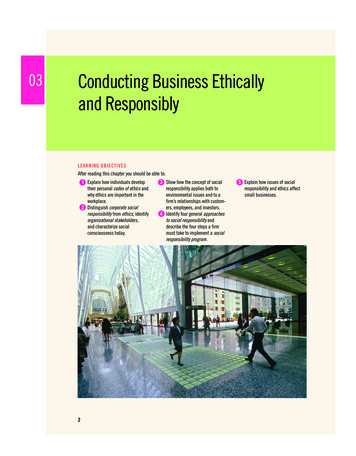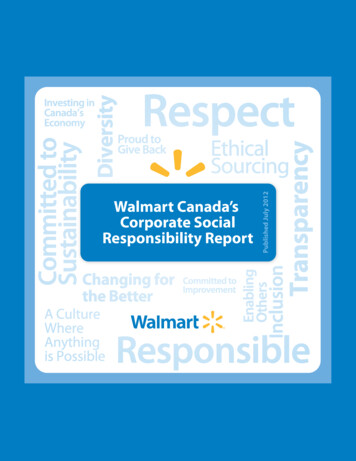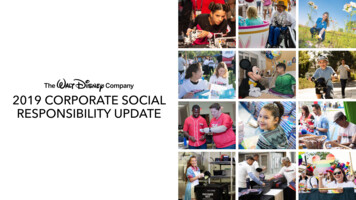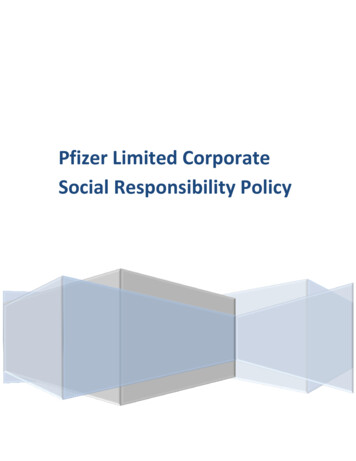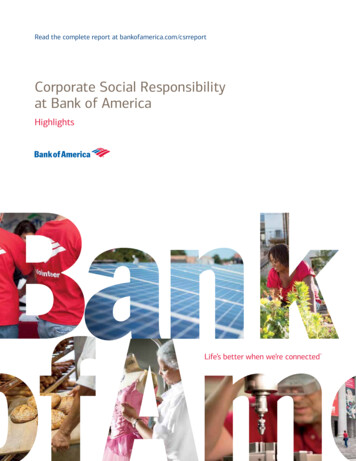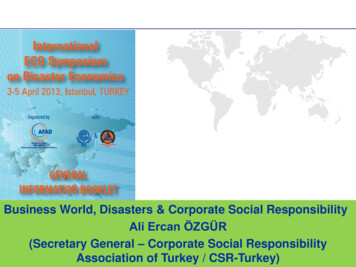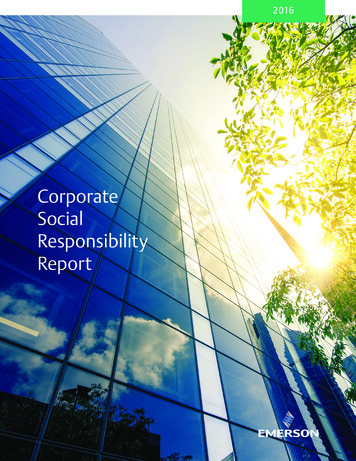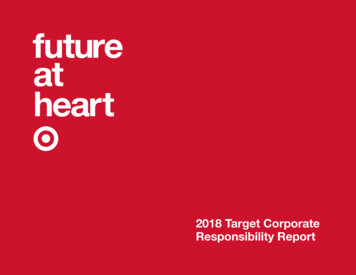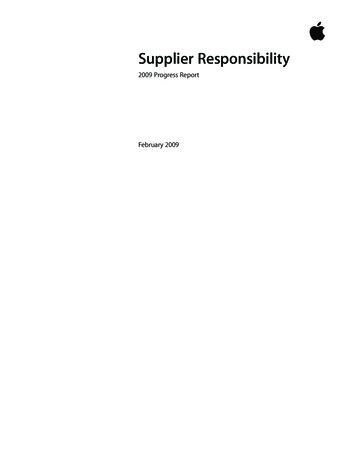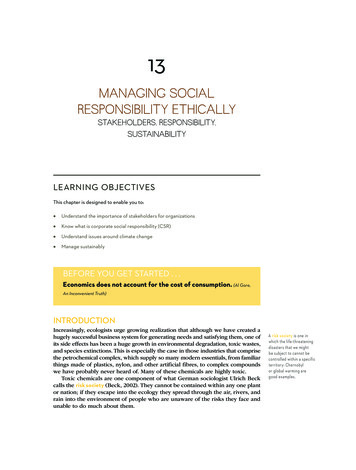
Transcription
13MANAGING SOCIALRESPONSIBILITY ETHICALLYSTAKEHOLDERS, RESPONSIBILITY,SUSTAINABILITYLEARNING OBJECTIVESThis chapter is designed to enable you to: Understand the importance of stakeholders for organizations Know what is corporate social responsibility (CSR) Understand issues around climate change Manage sustainablyBEFORE YOU GET STARTED . . .Economics does not account for the cost of consumption. (Al Gore,An Inconvenient Truth)INTRODUCTIONIncreasingly, ecologists urge growing realization that although we have created ahugely successful business system for generating needs and satisfying them, one ofits side effects has been a huge growth in environmental degradation, toxic wastes,and species extinctions. This is especially the case in those industries that comprisethe petrochemical complex, which supply so many modern essentials, from familiarthings made of plastics, nylon, and other artificial fibres, to complex compoundswe have probably never heard of. Many of these chemicals are highly toxic.Toxic chemicals are one component of what German sociologist Ulrich Beckcalls the risk society (Beck, 2002). They cannot be contained within any one plantor nation; if they escape into the ecology they spread through the air, rivers, andrain into the environment of people who are unaware of the risks they face andunable to do much about them.Clegg et al Sample.indd 13A risk society is one inwhich the life-threateningdisasters that we mightbe subject to cannot becontrolled within a specificterritory: Chernobylor global warming aregood examples.8/20/2015 11:38:12 AM
14MANAGING ORGANIZATIONAL PRACTICESCorporate socialresponsibilitycan be defined as theexplicit attempt by anorganization to signal thatit exceeds minimum legalobligations to stakeholdersthat are specifiedthrough regulation andcorporate governance,often by extending thenotion of stakeholdersto be more inclusive.BUSINESS FOR SOCIALRESPONSIBILITYMANAGING SUSTAINABLYInformed by such views, management scholars have argued that organizations need to adopt discourses and practices of corporate social responsibilityand sustainability. We shall explore these themes in this chapter. We shallbegin by looking at the fashionable business concept of corporate socialresponsibility.Corporate social responsibility (CSR) has been adopted as a formal policygoal by many advanced society governments and businesses. Organizations thatcommit to CSR typically adopt sustainable development goals that take accountof economic, social, and environmental impacts in the way they operate. Doingso is a relatively new approach – in the past most organizations exercised verylittle care for the despoliation of the environment or for sustainable development, especially those based on the exploitation of natural resources. Today,CSR is very fashionable: check the website of some favourite organizations –we would be very surprised if you did not find something that correspondsto a CSR statement.There is an excellent article in the Journal of Business Ethics by ElisabetGarriga and Domènec Melé (2004) that outlines the field in terms of instrumental, political, integrative, and ethical approaches. Generally, CSR is seen to be avoluntary commitment on the part of an organization to sustainable economicdevelopment that will improve the quality of life of its employees, their families,local communities, and society at large. A good example of these voluntary commitments is Business for Social Responsibility, a global organization that aims tohelp its members be successful in a sustainable way and respect ethical valuesof stakeholders and the environment.It is evident that, in pragmatic terms, the key questions for managers are whyorganizations should be concerned about sustainability and how they shoulddeal with the issue. (The Henry Stewart Talks series of online audiovisual seminars on managing organizations, edited by Stewart Clegg at www.hstalks.com/r/managing-orgs, includes one in particular that is a useful background to thischapter: Talk #16: Managing sustainably, by Professor Suzanne Benn.)Asking the why question can be used to differentiate ethical concerns frominstrumental concerns. Ethically, at one extreme, organizations should be seen tobe caring for a variety of stakeholders and the externalities that their operationscreate, because to do so serves ethical interests in the greater good. At the otherextreme, from resource dependency and institutional perspectives, organizations also need legitimation to operate and concern for other stakeholders is anefficient means to acquire legitimation. The second question, the how question,differentiates between techno-centric approaches, in which sustainability is seenas a technical problem, and power-sensitive approaches, in which the pressureof stakeholder interest makes sustainability a political issue (see Figure 13.1).Political g’CorporategreeningTechnocratic perspectivesFIGURE 13.1Clegg et al Sample.indd 14Perspectives on sustainability8/20/2015 11:38:13 AM
15Managing Social Responsibility EthicallyThere are three different levels of analysis implicit in any discussion of CSR. At theinstitutional level there are assumptions about the legitimation of organizationalactions in so far as they accord with institutionalized norms and values. At thislevel, general societal expectations and the framing and implementation of thesein practice by government determine the legitimacy of a particular organizationin its actions. At the organizational level organizations must take responsibilityfor what they do and do not do because they can be held legally accountable fortheir actions and non-actions. At the individual level the principle of managerialdiscretion presumes the morality and ethics of individual managers in their relationships with stakeholders. We shall begin our discussion with the latter first.STAKEHOLDER MANAGEMENTWhy should organizations today bother with CSR, especially those that are profitoriented? After all, neo-classical economists have long argued that business owesabstractions such as ‘society’ nothing: shareholders are the owners of business andbusiness’s obligation is to do everything (within the law) to advance shareholdervalue – not to squander it on well-meaning but irrelevant CSR projects. Unileverexecutive Harish Manwani (2013) makes an argument against this view in a TEDTalk titled ‘Profit’s not always the point’. His view is that there are other stakeholders apart from shareholders with interests in a firm. The stakeholder modelof the firm would insist that shareholders are but one set of stakeholders; thatthere are plenty of other significant stakeholders, ranging from customers, NGOs,communities, and civil society more generally, as well as activist groups claimingto articulate the interests of the environment, animals, disadvantaged people(s),or other ‘mute’ or muted stakeholders. The standard definition of a stakeholderis any person with an interest in the activity of an organization; in a slightly lessencompassing definition we might restrict it to those whom the organization affectswith their activities, such as owners, investors, employees, trades unions thatorganize the employees, customers, consumer associations, regulators, suppliers,and citizens living in sufficient proximity to an organization’s material presenceto be affected by it.Stakeholder theory, as a way of managing organizations, develops frameworkswithin which relevant stakeholders can be identified and defined. Often thesestakeholders are defined more restrictedly than their identification in broad termswould suggest. The more restricted approach limits stakeholders to those who arerelevant. Relevance is defined in terms of actual investments in the organizationthat makes them susceptible to risk from the organization’s activities. The latterapproach regards stakeholders in a more restricted way by emphasizing the voluntarist basis of the relation between an organization and stakeholders. Hence,employees, investors, owners, and suppliers might all be regarded as stakeholdersbut there might be questions about the inclusion of others. For instance, manyorganizations, such as Walmart, do not recognize the legitimacy of trade unionsas stakeholders because they seek to maintain union free operations. In this conception of stakeholders the definition is barely broader than that of shareholders:it does include employees and suppliers but is silent about broader based conceptions of stakeholding. Communities that experience a change to the amenitiesthat they have access to because of an organization’s impact would be excluded,irrespective of whether the effect was positive or negative. Stakeholders such ascommunities would be regarded as involuntary because they did not choose toenter into nor can they easily withdraw from a relationship with an organizationsuch as an airport whose planes fly over their houses or a toll way that dividestheir community with a multi-highway.Clegg et al Sample.indd 15STAKEHOLDERS8/20/2015 11:38:13 AM
16SELLING SUSTAINABILITYClegg et al Sample.indd 16MANAGING ORGANIZATIONAL PRACTICESLooked at in a broader way, the question of who the relevant stakeholdersshould be becomes one of time periods: if businesses are alert only to interestsin the short term they will probably pay most heed to those stakeholders whoseimpact is most immediate on their day-to-day operations: investors and stockmarket analysts, especially, because they affect the share price through their perceptions of ‘shareholder value’ – the earnings or losses they incur on their sharesin reporting periods. The problem is that if organizations only pay attention tothese short-term interests they may jeopardize other interests that might claimrepresentation or be represented which, in the long term, can boomerang back onthe business by attacking its legitimacy or reputation. Thus it becomes a matterof shareholder value to attend to broader stakeholder interests. As Vogel (2005)suggested, it may well be the standard business case that the primary responsibility of companies is to create wealth for their shareholders. But the emergenceof CSR and activists associated with it adds a twist: in order for companies to dowell financially, they must also act virtuously.An article published in the Academy of Management Review by Hahn et al.(2014) explores how managers interpret social issues such as CSR. Typically, theapproach is pragmatic, based on existing business routines; against this theyrecommend the importance of thinking paradoxically – sometimes launchingproducts because they seem to offer sustainable innovation, even if they are notimmediately profitable, such as hybrid cars, because in this way market sharemay be built on more sustainable foundations.In some European societies, such as Austria or Germany, the notion that thereis a social responsibility of business is well established. There has long been aconsensus view that organizations should be seen as a ‘social partnership’ builtupon a tacit and informal agreement between the government, the major employers’associations, and various employee interest groups. In the literature this is usuallyreferred to as corporatism where the state encourages cooperation among thesemajor stakeholders, who have increasingly adopted the rhetoric of CSR as it hasdeveloped in recent times.Höllerer (2010) has thoroughly examined CSR discourse in Austrian corporateannual reports since the early 1990s. A first focus of CSR is on sustainability ofprofits, people, and planet – often referred to as the triple bottom line. A secondfocus is on good corporate governance and enhanced transparency, which, third,situates stakeholder management as a key task of managing divergent interests.Fourthly, corporate values such as philanthropy and support of societal groupsin need that do not have power or voice in corporate decision-making is oftendeployed to demonstrate corporate responsibility for less privileged members of society. Often this is achieved by organization members doing voluntary service – charitywork – for underprivileged communities. Explicit use of CSR provides conceptualtools with which to address varied notions of social responsibility and advanceclaims for enhanced legitimacy. Doing this means that CSR becomes incorporatedinto the strategies of the organization.In many CSR accounts an assumption is that it is only humans that canbe stakeholders. More radical views, as we shall see, suggest that the naturalenvironment, the ecology, is also a stakeholder. One business leader whocomes close to embracing this view is Steve Howard, chief sustainability officerat IKEA, who presents a cogent corporate view of sustainability and how toachieve it, through setting and achieving 100 per cent targets. As he says, IKEAhas a sustainability strategy called ‘people and planet positive’ whose aim isto help guide the business to have a positive impact on the world. As he asksrhetorically, ‘Why would we not want to have a positive impact on the worldas a business?’8/20/2015 11:38:14 AM
Managing Social Responsibility Ethically17If only it were that easy: much of the controversy over climate science occursbecause of the inability of certain sections of business, government, and the community to accept that they have responsibilities to abstract conceptions such asglobal warming. However, as the findings of climate science become more widelyaccepted as incontrovertible, the idea that the natural environment is affected bythe actions of the organization and is therefore a stakeholder in the organizationcomes to be seen as normal. On this reasoning we are all beholden to the futureas a stakeholder in our present-day behaviours. It is for these reasons that themost critical debates about CSR tend to be about ecological and sustainabilityresponsibilities,
organizations, such as Walmart, do not recognize the legitimacy of trade unions as stakeholders because they seek to maintain union free operations. In this con - ception of stakeholders the definition is barely broader than that of shareholders: it does include employees and suppliers but is silent about broader based con-ceptions of stakeholding. Communities that experience a change to the amenities
